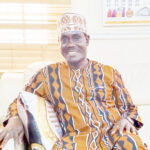Dr. Tunji Olugbodi is one of Nigeria’s most successful advertising and public relations entrepreneurs. As Executive Vice-Chairman, Verdant Zeal Group, he has built an enviable reputation as the man with the Midas’ touch. He shared the story of his journey through life’s challenges.
You’ve been described by friends as an innovator, strategist, content curator and many others, but for those in advertising, you are simply an advertising practitioner, controlling the affairs of an array of agencies in the sector, and, at the same time, making things happen. Could you let us into the ‘many other hats’ that you are wearing?
In truth, I have consciously modified, over time, the number of hats that I wear so that I do not continue to spread myself thin and ineffective in offering myself for service where necessary. But suffice it to say that I still proudly serve in different dimensions in several business concerns, professional circuits, spiritual obligations, and even social-oriented responsibilities. It’s just that I have become a lot more conscious of the need and cost of value, so I am giving myself more regenerative space. I am more circumspect with my speaking engagements for instance.
You sit atop one of the most successful advertising groups in the country today, the Verdant Zeal Group. Looking back, what would you say were the motivations for setting up the agency in 2007?
It was primarily to add value and elevate professional output and discourse. And I think we have been able to do that to a large extent. The good thing is that the business environment is dynamic and so is the need state per time. The strength we have over the years is to have been able to continuously master the needs of the clients and deliver with anticipatory effectiveness. We run, for instance, on what we call the OTOBOS –On Time, On Budget, On Strategy– concept. That remains true of every client’s desire today as it was 20 years ago in form and content. So, this is reflected in the speed of market designs and solutions. We also used other proprietary tools like Open Brand Probe (OPB) over time. In heightening the discourse, we have championed thought leadership in leadership interventions for over 12 years with the widely renowned “Innovation Series” which is now being formally elevated to a stand-alone body.
How would you assess the nation’s advertising space now compared with when you started about 16 years ago? Is there anything, of note, that has changed?
A lot has changed. First is the technology-enabled fragmentation which has further reduced, if not decimated, the barrier to entry. A lot of the practice has morphed into many smaller units of practice from what used to be. Some argue that what it has done is giving rise to further specialisation but that is not exactly so. What we have seen is unusual democratisation and liberalisation through tech tools that have taken away the halo effect on creative tools and marketing tactics. Many interventions have become artificial, short-term, and entirely tactical for one-off deployments. So today, we struggle to find real practitioners who are nurtured in the proud tradition-fed convention and practices. This is being actively repudiated by a new crop of clients and bohemian stragglers who just want to earn a living by any means possible.
The issue of global affiliations has not been without its controversies in the industry, with some of its vociferous critics arguing that it serves no real purpose other than to provide the foreign partner easy inroads into the nation’s market. How agreeable is this line of thought to you?
Affiliations in my opinion have served their time. The business environment today operates on an inverted principle. Business now happens here in Africa in higher prospects and proportions than in the West. In the past, the basis was usually to access higher business opportunities. Not any more, when we host some of the fastest growing economies, some of the fastest-growing start-ups, some of the highest number of unicorns, some of the most iconoclastic businesses from across the continent, brands with strong market equity gradually gaining ground, creativity manifesting with the dominance of our music, fashion, food, dance…it’s a new day with different indices and a different narrative and conversation. We have the numbers. Now we have the know-how to use our means and methodology. The rules of engagement have long changed. However, I believe there is still room for strategic collaboration in specific areas that can still be explored to mutual benefit, but this is no longer the 90s. Markets have been very protective of their assets and I frankly don’t blame them. It’s a survival of the capable.
The Advertising Regulatory Council of Nigeria (ARCON), a few years ago, embarked on major reforms of the industry, one of which is the introduction of the Advertising Industry Standards of Practice (AISOP). As a seasoned practitioner, what is your assessment of these reforms?
The reforms are very much needed. Again bear in mind that any society without aggregate strong institutions to regulate business practice and interface is courting trouble. What I do know is that as subsisting inter-sectorial groups, we have far less contending issues than before the advent of AISOP. In essence, the reforms may not be perfect, but they must be doing something right in my view. It boils down to the willingness to give it a chance and continue to fine-tune it as time progresses. What cannot be controverted is that it was designed in good faith; it means well for the industry, it seeks to be as accommodating and inclusive as possible and bears credence to the sense of responsibility on the side of government and its agency saddled with the responsibility of regulating the industry practice. As the immediate past President of IAA in Nigeria, we have even been approached by other chapters within IAA Global to share some of our regulatory templates and stories with them for knowledge and insight. Law and order. Pure and simple.
As you clock 60, how would you describe the journey so far?
It’s been interesting and humbling really. It’s like going to sleep and waking up suddenly and you wonder where all the years went, but really, it is also a time of stock-taking and sober reflection. My attitude is one of gratitude and thanksgiving.
I have also coalesced my thoughts around certain fundamental thoughts, decisions and priorities. Like family, they will remain top of mind going forward, compassion for others, setting sight for new goals in a more measured manner. Focusing on doing what is right and not necessarily what is convenient, being a lot more socially connected responsible and responsive, practising gratitude a lot more consistently, taking nothing for granted but fully content with His grace. Part of the new experience is to learn new things by reading, journeying and stepping out. This is important to prevent atrophy. That whole spirit of curiosity and thirst for knowledge must be rekindled. Above all, I am hoping I can laugh more by seeing the humour in everything.
It has been argued that one of the challenges facing Nigerian businesses and brands is the lack of a succession plan, a factor responsible for the country’s vast corporate tombstones, which continue to grow immediately after owners of businesses are off the scene. What are you doing within the Verdant Zeal Group to guide against this?
It’s a tough call because there are no easy-ready answers. I think it’s partly a cultural deficiency as well as a corporate ineptitude. I have seen cases in our industry of elaborate and structured succession plans executed over a period of time that still did not work out eventually. And this is made more difficult by the inclement macroeconomic environment we have today. What we are doing is to have a structured collegial approach with the Business Leadership Group as the arrowhead, with clear command and control.
Advertising is a highly demanding profession. How do you balance the strenuous nature of the job with the equally demanding assignment of ensuring harmony on the home front?
Truth is one will never be able to achieve a balance 100 per cent of the time but what has helped over the years is a very understanding family who understands the peculiarities of the business. One must, however, remain very conscious of this and seek to intentionally make up for the gaps as often as possible. But it does call for significant sacrifices.
If you had not gone into advertising, what profession would you have been now?
Most definitely academia. I love the Ivory Tower hood so very much.
Any regrets, be it professional or personal?
No, I never wallow in pity parties or regrets because my choices and decisions are always carefully weighed. Even when I make mistakes, and I often do, I automatically take it as part of the learning curve and I never dwell on it. As a man of faith, I am an incurable optimist so it helps me navigate the most challenging of times because I always see the glass as half full and not half empty. We must learn to live life in the present moment without dwelling on the past or worrying about the future.
What are the plans for the future?
I have spoken about that in part. It’s really to take life on much measured easier terms with a stronger dose of infectious optimism that above all else, it shall be well.
What advice do you have for young and upcoming advertising practitioners?
Be passionate; be focused; be dedicated to the craft; create a niche and nurture a high ground for yourself. Your differentiation is your selling point and equity. Without one, you carry no value.
NIN: How to modify your name, date of birth, phone number, others — NIMC
WATCH TOP VIDEOS FROM NIGERIAN TRIBUNE TV
- Let’s Talk About SELF-AWARENESS
- Is Your Confidence Mistaken for Pride? Let’s talk about it
- Is Etiquette About Perfection…Or Just Not Being Rude?
- Top Psychologist Reveal 3 Signs You’re Struggling With Imposter Syndrome
- Do You Pick Up Work-Related Calls at Midnight or Never? Let’s Talk About Boundaries







